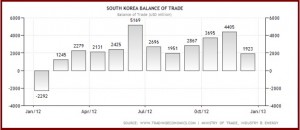While the Obama Administration promised U.S job growth after it pushed through the so-called Korean Free Trade Agreement last year, it has been quite costly so far for U.S. workers. The latest federal government trade data show that there has been a decline in U.S. exports to Korea and a rise in imports to $52.9 billion. The resulting annual trade deficit of -$16.6 billion belies the Administration’s promises that the pact would expand U.S. exports and create U.S. jobs.
The U.S. deficit with Korea in autos and auto parts increased 16% during the first year of the FTA. U.S. auto imports from Korea have surged by more than $2.5 billion. FTA boosters have touted “gains” in U.S. auto exports without noting that this increase totaled just $130 million, with fewer than 1,000 additional U.S. automobiles sold in Korea compared to the 1.3 million Korean cars sold here in 2012.
The UAW, beholden to Obama for the bailouts of Chrysler and General Motors as well as the propping up of Ford Motor with subsidized loans, supported the agreement, alone among all organized labor groups.
U.S. goods exports to Korea have dropped 10%, a $4.2 billion decrease, under the Korea FTA’s first year, in comparison to the year before FTA implementation. U.S. imports from Korea have climbed 2% percent for a $1.3 billion increase. The U.S. trade deficit with Korea has increased 37% for a $5.5 billion increase. The growing trade deficit indicates the loss of tens of thousands of U.S. jobs.
“The Korea pact’s damaging outcomes being the opposite of the administration’s promises will certainly complicate the administration’s current efforts to use the same claims about export expansion to persuade Congress to delegate away its constitutional trade authority or to build support for the administration’s next trade deal, a massive 11-nation Trans-Pacific Partnership (TPP) based on the same model,” said Lori Wallach, director of Public Citizen’s Global Trade Watch.
The decline in U.S. exports under the Korea FTA contributed to an overall disappointing U.S. export performance in 2012, placing the United States far behind Obama’s stated goal to double U.S. exports by the end of 2014. At the 2012 export growth rate of 2% percent, the United States will not achieve the president’s goal until 2032, 18 years behind schedule.
“Most Americans will not be shocked that another trade agreement has increased our trade deficit, because they know that these NAFTA-style deals are losers, but anger toward the politicians who keep supporting these deals is soaring,” claimed Wallach.


